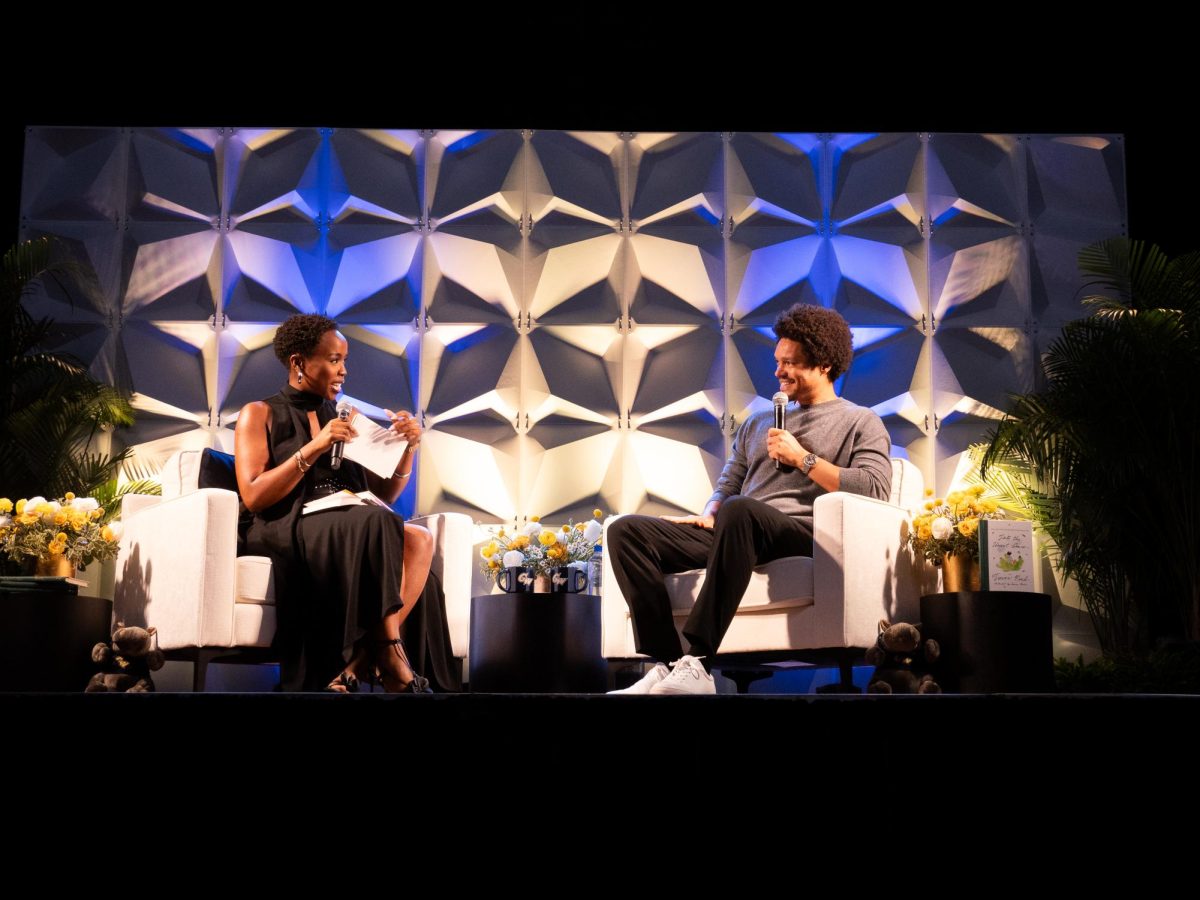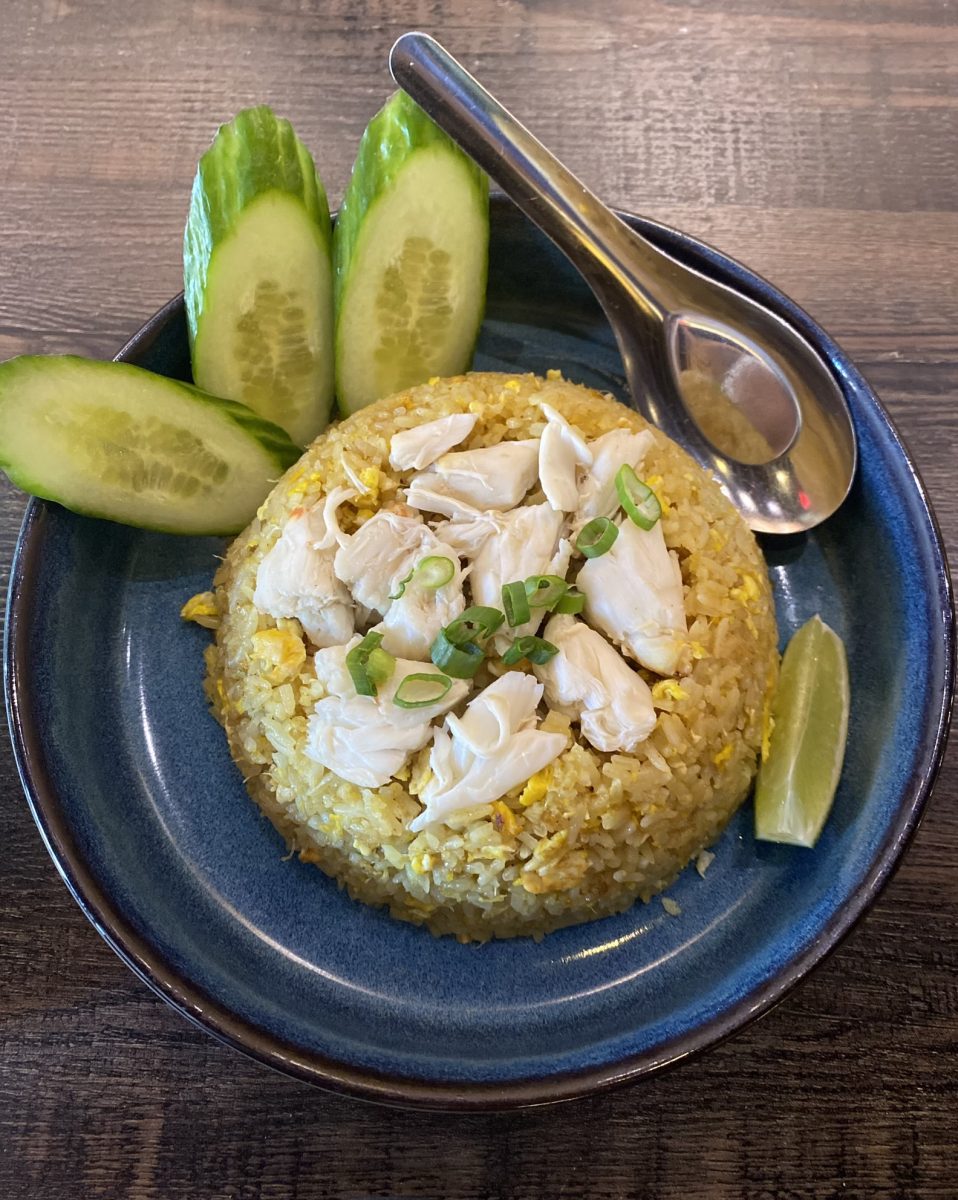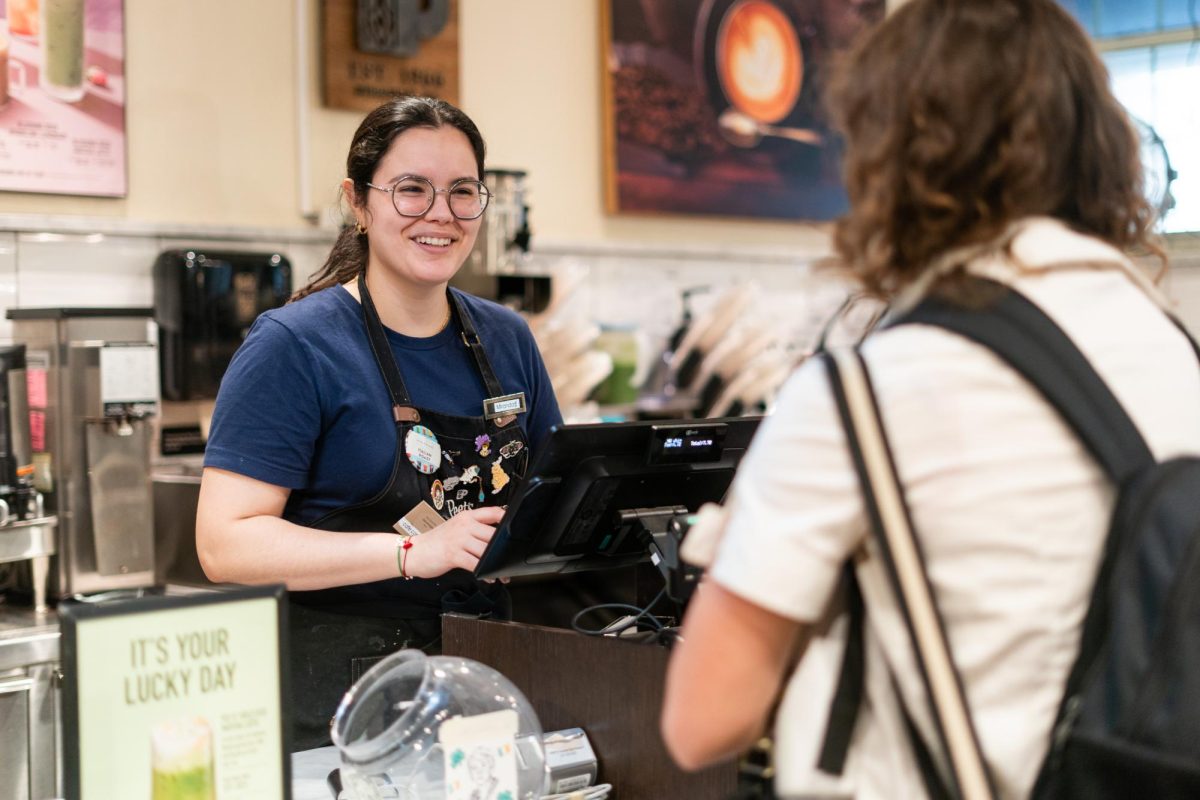Two years after closing the curtains on his tenure as host of “The Daily Show,” Trevor Noah is charting the political landscape through a new gig: becoming an author for kids.
After the Oct. 8 release of his new picture book “Into the Uncut Grass,” which follows a boy and his stuffed bear leaving home and journeying into the “uncut grass,” Noah chatted with GW alum and NBC News journalist Zinhle Essamuah in the Smith Center on Saturday about how children’s books shaped his worldview and can inform kids’ approach to conflict resolution. The moderated conversation before an audience of students and parents was a twist on the Alumni and Families Weekend’s typical stand-up comedy event, with past guests including Saturday Night Live’s Mikey Day, Michael Che and Leslie Jones, who cracked a series of raunchy jokes during their sets.
The Johannesburg-born entertainer began his career in South Africa through a series of hosting gigs before moving to the United States in 2011, where he went on to host “The Daily Show” from 2015 to 2022, four consecutive Grammy Awards ceremonies and the 2022 White House correspondents’ dinner. His debut book and memoir, released in 2016, “Born a Crime: Stories from a South African Childhood” was a New York Times No. 1 bestseller.
Chalk drawings adorned the sidewalks of campus Saturday, directing families and alumni to the Smith Center where a line of about 25 people formed before the event’s 8 p.m. door opening time. More than an hour later, nearly every seat on the floor and in the bleachers of the arena was filled before Noah took the stage.
The comedian easily won over the Smith Center crowd with his political commentary with a sprinkling of sarcasm as he fielded questions from Essamuah and students. The pair kicked off with a discussion about how Noah’s favorite children’s books growing up inspired him to take a crack at writing one of his own.
Noah said he set out to write a book like the ones he read growing up, which contain messages that readers can appreciate into adulthood — like how Roald Dahl’s “Charlie and the Chocolate Factory” can also be read as a critique of greed and capitalism.
“I love the layers and the nuance that you can find in a children’s book,” Noah said.
Noah said his central inspiration for writing the book centered around past conflicts he had with his mother throughout his childhood and how they worked through those conflicts by writing letters to each other. He said working through disagreements with parents is usually a child’s first exposure to conflict resolution, which he solidified as a central theme of “Into the Uncut Grass.”
“If you teach kids the elements of conflict resolution, I don’t know, maybe they’ll go into a world with more tools than we had,” Noah said.
Noah said receiving his ADHD diagnosis about four years ago was “the best thing in the world” because it helped him understand how he can better navigate a world that is primarily structured for neurotypical people. Applause filled the room when he addressed those with neurodivergent disorders, stating: “You’re not failing. You’re just not meeting up to the structure that has been built for one type of mind.”
Growing up as a biracial child in South Africa under apartheid and then living in the United States as an adult, Noah said he has found that the global Black community is not a “monolith” and is shaped by different nationalities but that all Black people can relate to the experience of facing systems of oppression.
“We don’t have the exact same life or the exact same vibe or the exact same anything,” Noah said. “But there is one commonality that all Black people share, and that is a form of oppression.”
Noah said young people have always played a central role in starting political revolutions, like how young people in South Africa led protests against apartheid in the 1970s and 1980s. After Essamuah asked him about his perspective on how Americans have responded to the war in Gaza, specifically through the pro-Palestinian encampments on college campus, Noah said older people too often focus on “chastising” students for the manner in which they protest instead of addressing the conflict that is sparking protests in the first place.
“If you go through history genuinely, and I’m not even a historian, but if you go, find me an example of a protest that was welcomed,” he said.
As the clock neared 11 p.m., Essamuah ran Noah through a list of rapid-fire questions, quizzing him on his preferred GW moniker — the Revolutionaries — and asking him to weigh in on the 2024 U.S. presidential election, to which Noah endorsed Vice President Kamala Harris after jokingly throwing his support to former President Donald Trump.
When Essamuah asked what is giving Noah hope right now, he responded “young people.”
“I think the biggest thing that gives me hope is the realization that we are currently living in the best time that humanity has ever been through, despite the fact that sometimes it doesn’t feel like it,” Noah said. “And what gives me hope is the idea that many times in history, people thought there would be no future, and yet here we are.”
Essamuah and Noah’s conversation struck a balance between comedic jokes and reflections on family, identity and politics that sparked both periods of laughter and silent reflection from the audience. Attendees of this year’s fall show did not leave empty-handed, with each guest receiving a hard copy of Noah’s new book.
First-year Delia Radick said she enjoyed Noah’s discussion of navigating his depression and the trauma he endured growing up. She added that he liked his analogy of comparing “being dealt a horrible hand in life” to feeling buried alive but continuing to dig toward the surface.
“I didn’t really know too much about him before this, but I think it was super interesting hearing his perspective on that,” Delia said.
Delia’s parent Rob said he decided to see Noah speak at the event after he loved reading “Born a Crime.” He said his favorite part of the event was Noah’s discussion on how public opinion on protest movements can change over time, like how critics painted Martin Luther King Jr. as a “troublemaker” during the Civil Rights Movement but now King is widely celebrated across the country for his work as a civil rights leader.
“That was kind of powerful, I thought, and maybe provided some hope for what seems like kind of dark time sometimes, and it was nice to have a break from the dark times now,” Rob said.




